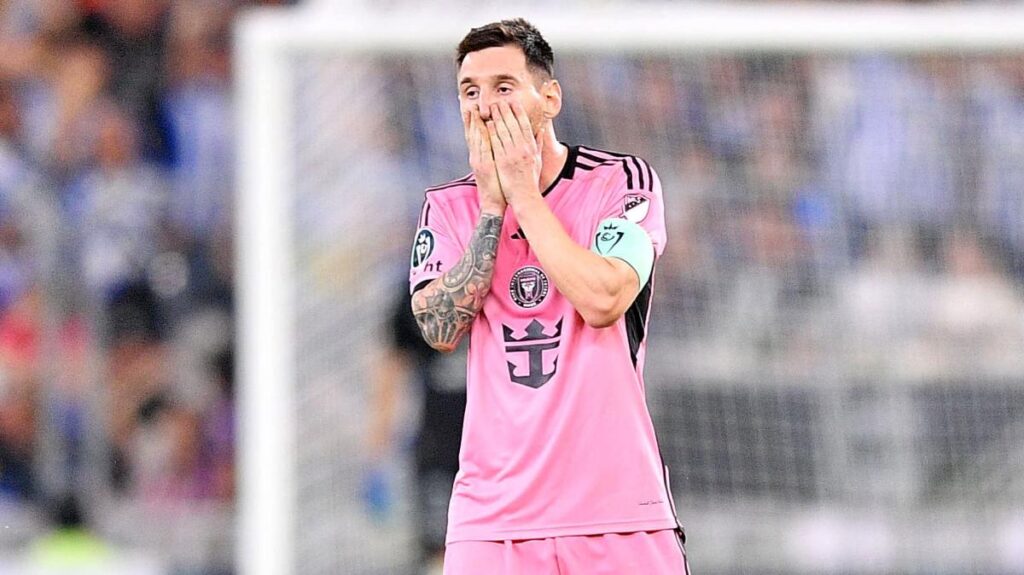Inter Miami's wildest dreams will reach their climax in the summer of 2025, when Lionel Messi's contract ends. They will take on Europe's superpowers, culminating in a glorious new stage in the Club World Cup. They would amplify Messimania and take American soccer to new heights, at least that was the vision.
But on Wednesday night, rain fell in northern Mexico. Daydreaming turned into frustration. The lofty ambition almost disappeared 14 months before it became a reality. Messi and Miami lost 3-1 to Monterrey at the hard-fought Estadio BBVA. They lost 5-2 on aggregate in the CONCACAF Champions Cup quarterfinals.
The loss was due to Messi missing the first leg of his second match due to injury. They lost because their overwhelming teammates made mistakes. They lost for dozens of reasons, and disappointed fans will be analyzing them over the next few days.
But the underlying reason was fairly simple. Even the GOAT could not close the still huge gap between Major League Soccer and Mexico's best Liga MX.
Monterrey was better.Monterrey teeth Better. On Wednesday, the evidence was everywhere.
He ran up and down the left side and ran through the midfield. It fit perfectly into the space Messi often likes in MLS, but that space closed half a second earlier than usual. The first 20 minutes of a one-sided second half dazzled Inter Miami. RayadosMonterrey, as he was known, seized control and took the dagger home.
That night, a goalie error gave them a 1-0 lead.
But it was that dominant 20 minutes that defeated Miami. Germán Bertelame led Monterrey 4-1 on aggregate.Six minutes after Belterrame's goal, Jesus Gallardo won 5-1.
And at that time, Ores began to ring around the stadium known as “.El Gigante de Acero“Steel Giant.”
“That's where the tournament ended for us,” Miami coach Tata Martino said.
It was then that Luis Suarez started throwing words at the innocent referee.
That's when Jordi Alba's frustration boiled over and he was handed a yellow card, a second red card and a red card.
Messi, on the other hand, looked defeated. By the end of 90 minutes, Assisted Miami's only goal, he seemed resigned to his fate. He greeted the final whistle with a respectful handshake and hug, signifying a loss to a better team.
For most of his 90 years, he continued to shoot as usual. He was often lost in thought, sometimes appearing to be asleep, waiting for an opportunity to explode. Every time he touched the ball, boos could be heard from the raucous crowd. He responded with several sharp movements in midfield, snapping the ankles of Monterrey defenders several times.
But he was also frustrated. After he took a shot in the 25th minute that narrowly missed the crossbar, he was furious at his teammates for not spotting him sooner. When they found him, and when he found pieces of space, usually sharp passes were often intercepted.
And when he failed to juke past Gerardo Arteaga late in the first half, he got into an altercation with a Monterrey defender.
He won a free kick in the first half, but when it went wide of goal, he looked down at the tattered grass and grew frustrated.
Messi, making his first start since March 13 after missing four weeks with a hamstring injury, was far from his best. But of course, he was far from Inter Miami's main problem. Their problem was a shallow, top-tier roster that was depleted by injuries and held back by MLS's self-imposed spending limits.
MLS clubs have unlimited spending on three designated players (DPs), so they can afford to sign Messi and Sergio Busquets. However, Byzantine roster rules limit your ability to build an out-and-out team around a superstar. In last week's first leg, Miami fielded an academy player and a second-round draft pick. Monterrey had more than a dozen DP-level players and grabbed a 2-1 victory in the second half.
In Wednesday's second leg, Miami only filled nine of the 12 bench spots and made zero substitutions. Monterrey took advantage of the opportunity when their legs were starting to get tired and brought in talented reinforcements from the bench and achieved a big victory.
Martino said last week that MLS clubs are feeling the effects of the “handicap” roster rules.
“We have the following limitations [create] There is a difference,” Martino said, and his words proved prescient.
These differences, combined with bad luck, crushed their dreams.
The Champions Cup was the only known ticket to the first Club World Cup (32 teams) to be held in the United States next summer. Real Madrid and Manchester City have qualified. Bayern Munich and Paris Saint-Germain are participating. Twenty-one teams from six continents have already booked tickets, including three from CONCACAF, the region that includes North and Central America. His fourth and final slot in CONCACAF will be awarded to the winner of the 2024 Cup of Champions.
Therefore, Inter Miami made it a priority. They have rested players, including Messi, in MLS matches. They gave their all to this continental championship, and “everything'' was on full display in the Round of 16 match against Nashville SC.
However, it wasn't enough against Monterrey, one of Mexico's top three teams.
There is still one wild card spot left for the Club World Cup. Since it is hosted by the United States, the award will go to the American team, but organizers have not disclosed how (or to whom) it will be awarded. “Learn more [will be] This will be provided in due time,” FIFA said.
So there is hope. Those wild dreams haven't completely disappeared. But in Messi's first full season, Inter Miami's run to claim the biggest prize in North American soccer is over.


